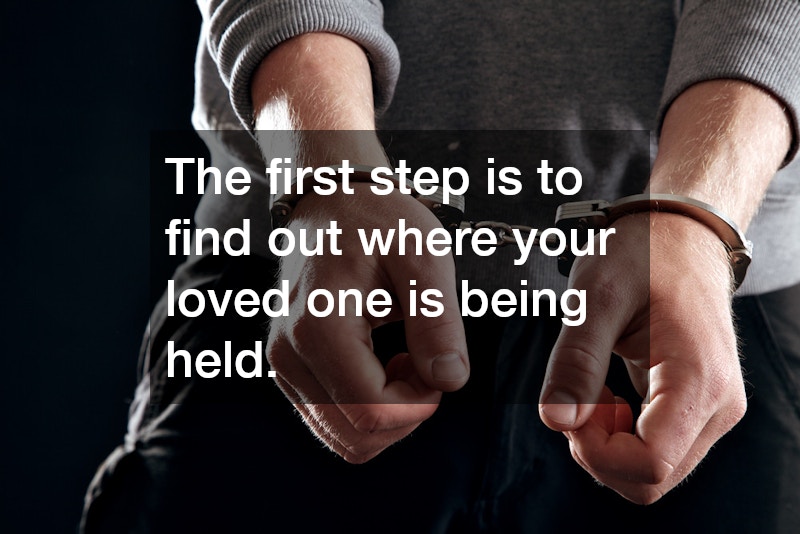Learning that a loved one has been arrested can be an overwhelming experience. It’s natural to feel a mix of emotions, from shock and confusion to worry and frustration. However, it’s crucial to stay calm and gather all the relevant information regarding their arrest. Knowing the details can help you make informed decisions moving forward. Remain objective and avoid jumping to conclusions about their guilt or situation.
The first step is to find out where your loved one is being held. You can contact the local police department or use online tools that provide arrest information. Having the exact location allows you to confirm the nature of the charges and understand the legal process ahead. This knowledge will equip you to communicate effectively with legal counsel or any bail bond service. Remember, accurate information is the foundation for effective support.
Understanding the legal implications of their arrest is essential. Depending on the charges, there may be serious consequences, and the legal process can be lengthy and complicated. Furthermore, knowing the charges can impact how you choose to support your loved one. Be prepared to do some research or consult a legal professional to better understand the potential outcomes. Being informed will enable you to offer the appropriate guidance and assistance.
Immediate Steps to Take
Once you have a handle on the situation, your immediate priority should be ensuring your loved one’s safety and securing their release. First and foremost, inquire if bail is an option. If bail is set, you’ll need to decide whether you should pay it directly or enlist a bail bond service. A bail bond service can provide the necessary funds for a fee, allowing your loved one to be released from jail and prepare for their court proceedings from home.
Contact a lawyer or public defender as soon as possible to represent your loved one. Legal counsel can offer crucial advice on the next steps and work towards a favorable outcome. An experienced attorney will guide you through the legal process, ensure that your loved one’s rights are protected, and help in negotiating bail terms. Keep open communication lines with the lawyer to stay updated on any developments. This partnership is vital for effectively navigating the legal complexities involved.
Ensure you have all required documentation ready, such as identification and any necessary forms. Being organized and prepared will facilitate smoother interactions with law enforcement or bail bond services. Keep copies of all documents, such as receipts and legal paperwork, as they will be required for future reference. Having everything in order will save time and reduce the stress of handling the arrest aftermath. This organized approach reflects your commitment to supporting your loved one through this challenging ordeal.
Providing Emotional Support
Providing emotional support is crucial when someone you care about is facing legal troubles. Remember to listen to their concerns without judgment, offering a compassionate ear. Often, your presence and willingness to understand can be immensely comforting. Avoid passing judgment or jumping to conclusions, as they need your support, not criticism. Let them know you are there for them, and reassure them that they are not alone in facing this challenge.
Discuss the situation openly and honestly, addressing their fears about possible outcomes. Open communication can alleviate their anxiety and foster a strong support system. Encourage them to share their feelings and be patient as they navigate this complicated emotion. While you may not have all the answers, showing empathy and understanding can significantly boost their morale. They need to feel they have a trusted ally on their side every step of the way.
It’s also important to focus on mental health by managing stress through healthy outlets. Encourage them to engage in self-care practices that can ease their emotional burden, such as meditation, exercise, or creative activities. Remind them that seeking help from a counselor or therapist is an option if they feel overwhelmed. Supporting mental well-being can make a significant difference in their ability to cope with the situation effectively. Reinforce the importance of maintaining a positive outlook and focusing on the road to resolution.
Long-Term Considerations
Beyond the immediate aftermath, it is important to consider the long-term implications of the arrest. Depending on the severity of the charges, legal proceedings may take months or even years. Encourage your loved one to remain focused on their objectives and not dwell on the stress of the situation. It’s crucial to follow all court orders, attend court dates, and comply with any legal requirements. This discipline will aid in minimizing negative repercussions.
Consider the financial impact of the arrest, which could include lawyer fees, court costs, and potential fines. Planning a budget and exploring financial options can ease the burden. A bail bond service, for instance, can offer an affordable alternative to posting bail directly. Keep track of these expenses and communicate openly with your loved one to manage financial expectations. Being financially prepared can prevent the added stress of monetary concerns during legal proceedings.
Finally, assist your loved one in rebuilding their life after the legal matter is resolved. This might involve helping them find employment, manage any reputational impact, or reintegrate into the community. Emphasize the importance of learning from the experience and moving forward positively. Encourage them to leverage available resources and support networks for a fresh start. By focusing on long-term recovery, you help them turn a challenging experience into an opportunity for growth and change.



